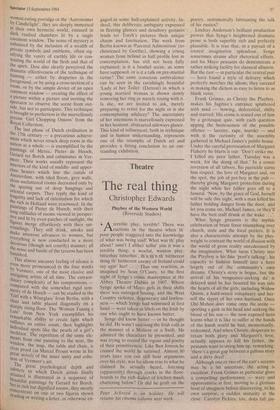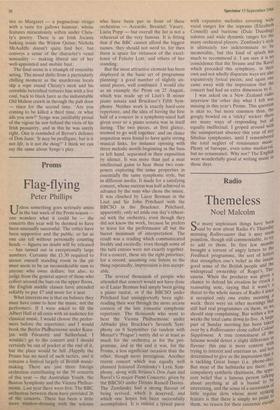Theatre
The real thing
Christopher Edwards
Playboy of the Western World (Riverside Studios) terrible play, terrible! There was ructions in the theatre when th' poor people staggered into the knowledge of what was being said! What was th' play about? amn't I afther tellin' you it was a terrible thing; a woeful, wanton play; bitterhin' bitterhin', th'n th'n th' bittherest thing th' bittherest enemy of Ireland could say agin' her! . . .' Thus one reaction, as imagined by Sean O'Casey, to the first night of Synge's comic masterpiece at the Abbey Theatre Dublin in 1907. Where Synge spoke of 'Mayo girls in their shifts there was outraged booing, and the West Country violence, degeneracy and lawless- ness — which Synge had witnessed at first hand — were taken as libels on the Irish by one who ought to have known better.
Synge did know better — or he thought he did. He wasn't satirising the Irish yolk in the manner of a Moliere or a Swift. He admired the characters he presented, and was trying to record the vigour and poetry of their primitiveness. Like Ben Jonson he created the world he satirised. Almost 80 years later you can still hear arguments over his style; was his idiom true to what he claimed he actually heard, listening (apparently) through cracks in the floor- boards to the rich dialect of kitchen maids chattering below? Or did he graft on the
poetry, sentimentally fabricating the talk of his rustics?
Lindsay Anderson's brilliant production proves that Synge's heightened dramatic prose is both superbly rich and perfectly plausible. It is true that, in a pursuit of a rooted imaginative splendour, Synge sometimes strains after rhetorical effects, and his Mayo peasants do demonstrate a rather striking facility for classical allusion.
But the east — in particular the central pair — have found a Style of delivery which perfectly matches the idiom; they succeed in making the diction as easy to listen to as blank verse.
Frank Grimes, as Christy the Playboy, makes his fugitive's entrance splattered with mud — bowing, deferential, shifty and starved. His crime is teased out of him by a grotesque quiz, with each question upping the heinousness of the possible offence — larceny, rape, murder — and with it the curiosity of the assembly gathered in Michael James's public house.
Under the careful provocation of Margaret Flaherty he blurts it out: 'Don't strike me.
I killed my poor father, Tuesday was a week, for the doing of that.' In a comic inversion of all taboos, his parricide earns him respect, the love of Margaret and, on the spot, the job of pot-boy in the pub thereby giving Margaret protection during the night while her father goes off to a funeral. 'Now, by the grace of God, herself will be safe this night, with a man killed his father holding danger from the door, and let you come on, Michael James, or they'll have the best stuff drunk at the wake...'. What Synge presents is the mythic celebration of brute force triumphing over church, state and the local peelers. It is also a characteristic attempt by the play- wright to contrast the world of illusion with the world of gross reality unredeemed by the imagination. What turns Christy into the Playboy is his fine 'poet's talking', his capacity to fashion himself into a hero largely out of the community's own dreams. Christy's story is bogus, but the arrival of his vengeance-seeking da' is delayed until he has boasted his way into the hearts of all the girls, including Widow Quinn, a hard-nosed voluptuary and her-
self the slayer of her own husband. Once Old Mahon does come onto the scene -
sporting a gash in his head and seeking the blood of his son — the now exposed hero learns what it is like to suffer at the hands of the harsh world he had, momentarily, redeemed. And when Christy, desperate to retain both glory and Margaret's love, actually appears to kill his father, the peasants want to string him up, remarking: 'there's a great gap between a gallous story and a dirty deed'. Although one or two of the cast's accents may be a bit uncertain, the acting is excellent. Frank Grimes in particular gives a compelling performance — wary and opportunistic at first, moving to a glorious bout of smugness before discovering, to his own surprise, a sudden maturity at the close. Carolyn Pickles, too, does full jus-
tice to Margaret — a pugnacious virago with a taste for gallows humour, whose features miraculously soften under Chris- ty's poetry. There is an Irish Jocasta lurking inside the Widow Quinn; Nichola McAuliffe doesn't quite find her, but conveys a sense of the character's venal sensuality — making liberal use of her well-appointed and mobile bust. The final scene is a triumph of ensemble acting. The mood shifts from a particularly chilling moment as the murderous locals slip a rope round Christy's neck and his erstwhile betrothed tortures him with a live coal, back to black farce as the indomitable Old Mahon crawls in through the pub door — risen for the second time. 'Are you coming to be killed a third time, or what ails you now?' Synge was justifiably proud of the vigour he saw behind the vices of his Irish peasantry, and in this he was surely right. One is reminded of Byron's defence of Don Juan: 'It may be profligate, but is it not life, is it not the thing?' I think we can say the same about Synge's play.



















































 Previous page
Previous page